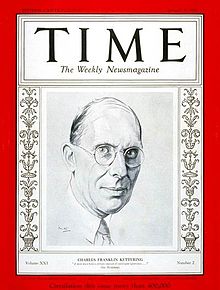 However, there is also a much stronger and much more subtle force at work in our world, one which we are likely unaware. In fact I was not even aware of it until a few weeks ago when a parishioner loaned me a biography of Charles F. Kettering, the innovative and indefatigable inventor and engineer of Dayton, after whom the town of Kettering is named. In this biography, Boss Kettering: Wizard of General Motors, there is a chapter called “Customer Dissatisfaction”. In it, Kettering establishes the concept that the auto industry would succeed financially only if their customers were actually perpetually dissatisfied. Not in the sense customers were to be unhappy with the cars they bought, and certainly not that Kettering wanted to make a substandard product. His point being that the industry needed to tap into people’s desire to want something better than what they already had – to be ‘dissatisfied’ with what they currently owned in order to want the next, newer version. Thus Kettering was instrumental in establishing the auto industry practice of cranking out a new model version every single year. What is remarkable is that Kettering was making these observations and arguments some 90 years ago.
However, there is also a much stronger and much more subtle force at work in our world, one which we are likely unaware. In fact I was not even aware of it until a few weeks ago when a parishioner loaned me a biography of Charles F. Kettering, the innovative and indefatigable inventor and engineer of Dayton, after whom the town of Kettering is named. In this biography, Boss Kettering: Wizard of General Motors, there is a chapter called “Customer Dissatisfaction”. In it, Kettering establishes the concept that the auto industry would succeed financially only if their customers were actually perpetually dissatisfied. Not in the sense customers were to be unhappy with the cars they bought, and certainly not that Kettering wanted to make a substandard product. His point being that the industry needed to tap into people’s desire to want something better than what they already had – to be ‘dissatisfied’ with what they currently owned in order to want the next, newer version. Thus Kettering was instrumental in establishing the auto industry practice of cranking out a new model version every single year. What is remarkable is that Kettering was making these observations and arguments some 90 years ago. Kettering’s point reveals that we live in a constant state of dissatisfaction. How many times do we buy something new, not because the current version we have is broken or defective, but simply because a newly innovated, updated version has just come out? Retail therapy anyone? How much energy and resources do industries and businesses put towards sustaining and tapping into our innate sense of dissatisfaction, convincing us we must have things we don’t really need. What I find most striking is that many of us are consciously unaware of this sense of dissatisfaction.
 While this sense of dissatisfaction is readily connected to technology, it is nothing new, nor limited only to
While this sense of dissatisfaction is readily connected to technology, it is nothing new, nor limited only to Paul admonishes the Colossians to make sure that “no one takes you captive by philosophy and empty deceit, according to human tradition” (2:8). He wanted them to not chase after religious practices and observances to be better Christians, and so feed their sense of dissatisfaction. Instead he urges them to be satisfied with Jesus Christ. In Colossians Paul gives us some of the grandest and richest descriptions of Christ in all the New Testament. “For in him all the fullness of God was please to dwell” (1:19). There is no one greater than Jesus, the God-Man, and nothing sweeter than his Gospel, and yet, as Augustine pointed out, “Our hearts are restless, until they rest in Thee.” Learning to be satisfied in life is a constant challenge, and certainly part of our life of faith we are to learn to be satisfied with God’s saving grace in Christ. During July we will be reading through Paul’s letter to the Colossians. May we heed its glorious presentation of Jesus Christ, and learn from its sacred message to die to our dissatisfaction and trust in and be satisfied with Christ alone – for all else will leave us wanting.


No comments:
Post a Comment